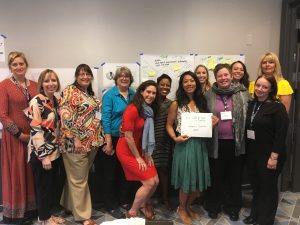
In June, ACT’s Center for Equity in Learning and ACT’s Product Line Management Horizon3 team convened a group of external researchers, practitioners, and foundations to discuss post-secondary completion and retention in a three-day Design Sprint in Minneapolis.
The Center builds partnerships within ACT as well as with external stakeholders to help underserved learners and working learners achieve education and career success. ACT Product Line Management Horizon3 team’s mission is to diversify the product portfolio of ACT through innovative products and services. This team researches and validates new product and service concepts that address unmet customer needs in the education and workforce readiness market worldwide. Working together, the two teams leveraged their strengths to bring a unique group together to brainstorm ways to help underserved learners, keeping equity and the consumer always at the forefront.
Design Sprints are highly focused working sessions answering critical questions through design and prototyping. With help from ACT’s Client Relations team, the Center pulled together a diverse group of participants with representatives from Achieving the Dream, American Association of Community Colleges, The Aspen Institute, BridgeEdU, Community College Research Center, East Mississippi Community College, Northern Oklahoma College, and The College of St. Scholastica.
This Design Sprint was a first for ACT, where all participants were from external organizations, which was key to gaining an outside-in perspective, and to making sure the voice of the customer was always front and center. The sprint was co-hosted by Center for Equity in Learning Vice President for Social Impact Melissa Murer Corrigan and Horizon3 Senior Director Adrienne Leahey. Jonna Higgins-Freese, ACT Horizon3 program director, facilitated the sprint.
“This was a powerhouse group,” said Murer Corrigan. “We invited a variety of people from across the country. The participants meshed well, and quickly formed a bond with each other.”
One of the Design Sprint participants, Megan Perry-Spears, dean of students at The College of St. Scholastica, shared, “the opportunity to sit, think, design and create in order to solve real problems for our students was a gift! To have a group of very bright people with very diverse perspectives on higher ed come together to collaboratively identify and tackle some of the most intractable problems that prevent student graduation was an extraordinary thing. I hope our ideas will make a difference to others– I know that the process and experience has already had a positive impact on me and my work as a practitioner and leader in my institution.”
Collaboration and convening groups are powerful tools that we will continue to implement and build. When bringing two or more groups together to collaborate on a topic they are passionate about, everyone emerges stronger.
